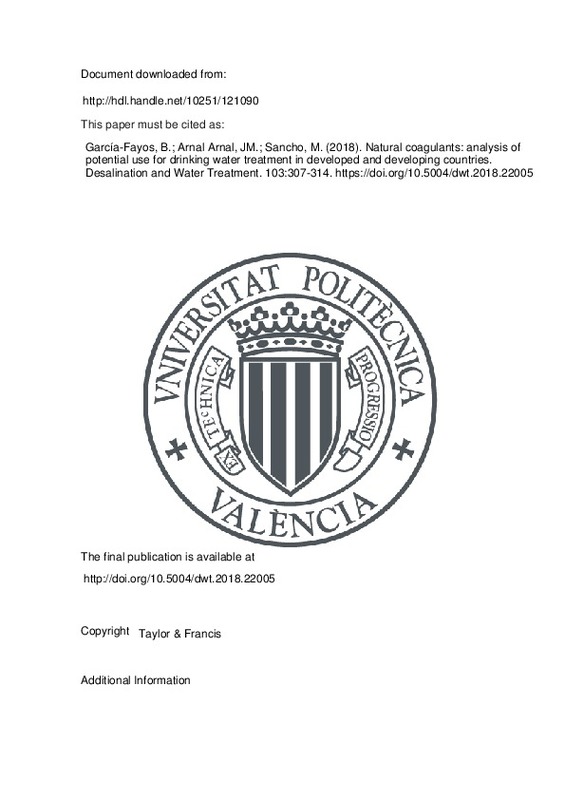JavaScript is disabled for your browser. Some features of this site may not work without it.
Buscar en RiuNet
Listar
Mi cuenta
Estadísticas
Ayuda RiuNet
Admin. UPV
Natural coagulants: analysis of potential use for drinking water treatment in developed and developing countries
Mostrar el registro sencillo del ítem
Ficheros en el ítem
| dc.contributor.author | García-Fayos, Beatriz
|
es_ES |
| dc.contributor.author | Arnal Arnal, José Miguel
|
es_ES |
| dc.contributor.author | Sancho, M.
|
es_ES |
| dc.date.accessioned | 2019-05-25T20:39:37Z | |
| dc.date.available | 2019-05-25T20:39:37Z | |
| dc.date.issued | 2018 | es_ES |
| dc.identifier.issn | 1944-3994 | es_ES |
| dc.identifier.uri | http://hdl.handle.net/10251/121090 | |
| dc.description.abstract | [EN] Drinking water must be colorless, odorless and tasteless, and free of substances or micro-organisms that can cause disease. The process to obtain drinking water is purification, understood as the treatment to make water suitable for human consumption. Water purification is traditionally composed of a sequence of standard treatments including coagulation-flocculation, sedimentation, filtration, and disinfection. Some compounds named coagulants are used for coagulation-flocculation, which is the stage in which the suspended matter is removed and the water is clarified. Coagulants are usually synthetic, therefore represent a high cost and are difficult to gets in some areas, especially in developing countries. In addition, their use is being revised and restricted in different international standards, in order to control or prohibit its use because of the possible hazard effects that the remains of these products in treated water can cause to people. In contrast to synthetic coagulants, there are several natural compounds with coagulation properties which have some advantages such as easy availability and safety. At present, scientific community is paying more attention to natural coagulants as legal restrictions to synthetic ones are becoming more severe. This paper is a review of natural coagulants as an alternative to chemical coagulants, in which their potential application in the treatment of drinking water is analysed. | es_ES |
| dc.language | Inglés | es_ES |
| dc.publisher | Taylor & Francis | es_ES |
| dc.relation.ispartof | Desalination and Water Treatment | es_ES |
| dc.rights | Reserva de todos los derechos | es_ES |
| dc.subject | Drinking water | es_ES |
| dc.subject | Natural coagulants | es_ES |
| dc.subject | Water purification | es_ES |
| dc.subject.classification | INGENIERIA QUIMICA | es_ES |
| dc.title | Natural coagulants: analysis of potential use for drinking water treatment in developed and developing countries | es_ES |
| dc.type | Artículo | es_ES |
| dc.type | Comunicación en congreso | es_ES |
| dc.identifier.doi | 10.5004/dwt.2018.22005 | es_ES |
| dc.rights.accessRights | Abierto | es_ES |
| dc.contributor.affiliation | Universitat Politècnica de València. Departamento de Ingeniería Química y Nuclear - Departament d'Enginyeria Química i Nuclear | es_ES |
| dc.description.bibliographicCitation | García-Fayos, B.; Arnal Arnal, JM.; Sancho, M. (2018). Natural coagulants: analysis of potential use for drinking water treatment in developed and developing countries. Desalination and Water Treatment. 103:307-314. https://doi.org/10.5004/dwt.2018.22005 | es_ES |
| dc.description.accrualMethod | S | es_ES |
| dc.relation.conferencename | I International Congress on Water and Sustainability | es_ES |
| dc.relation.conferencedate | Junio 26-27,2017 | es_ES |
| dc.relation.conferenceplace | Terrassa, España | es_ES |
| dc.relation.publisherversion | http://doi.org/10.5004/dwt.2018.22005 | es_ES |
| dc.description.upvformatpinicio | 307 | es_ES |
| dc.description.upvformatpfin | 314 | es_ES |
| dc.type.version | info:eu-repo/semantics/publishedVersion | es_ES |
| dc.description.volume | 103 | es_ES |
| dc.relation.pasarela | S\379228 | es_ES |







![[Cerrado]](/themes/UPV/images/candado.png)

